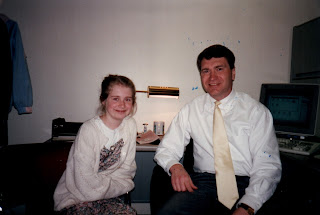The Red Pen
Looking back, I'm not entirely sure what it was about the red pen that I thought was going to be so gratifying. I'd like to think that it symbolized my ability to help guide my students to improve their writing -- to help mold untapped potential into something stronger, more precise, more effective. But maybe there's also a power in holding that red pen -- the power to shape and manipulate language, to bend it to your will. And maybe, deep down, that's what really appealed most to the writer in me.
Pretty quickly, I learned two things: 1) The "red pen" was really more of a metaphorical thing. By the time I started teaching in 2007, research indicated that marking students' work with the color red (a color associated with rage and aggression) was potentially damaging to their self-esteem, so I threw out my red pens and bought a bunch of other, more cheerful colors, and 2) Teaching English was mostly not about wielding the (now metaphorical) red pen. Much of my time was actually spent in meetings, planning lessons, wrestling with technology, problem-solving classroom management issues, scrambling to read and re-read the novels I needed to teach, etc. When I did finally collapse onto my couch each evening with a mounting stack of essays to mark up with my purple (or green, or pink, or light blue) pen, I was mentally tapped out, making the process far less satisfying as I thought it would be. What I ended up liking most about teaching English was what happened in the classroom -- developing a rapport with my students, facilitating class discussions around writing and literature, and helping them build the skills they'd need to be successful in college and in their careers.
When my older two kids (now 7 and 9) were babies, I took a few years off from classroom teaching. During that time, I was fortunate enough to be offered a part time position at a local community college in the writing center. It was, to date, my favorite job ever. Gone were many of the responsibilities of teaching that I had found frustrating or tedious. My only responsibility each day was to show up, roll up my sleeves, and get to work helping students with whatever writing assignments they were working on. I was able to sit side-by-side with motivated students who truly wanted to learn how to become better writers. Together, we'd read through their drafts, marking them up (usually with pencil - no red pen in that setting, either). In real time, I was able to explain to them why they needed a semi-colon instead of a comma, or how they could further strengthen a particular argument, or how to properly cite their sources in APA or MLA format. Every day was different, every student was different, and I was truly excited to show up every day and find out who might be waiting for me and how I could help them improve their writing.
But alas, life happened and I ended up needed to go back to full-time teaching (and also ended up going back to grad school for my Reading Specialist cert), so I was not able to keep my position at the community college writing center beyond a couple years. This time, I went back to the K-12 setting not as an English teacher but as a Reading Interventionist. It was a change, but I loved it. Instead of discussing Shakespeare and Steinbeck, I spent my days giving diagnostic reading assessments, poring over data, planning and implementing interventions, and working with teachers to improve their supports for struggling readers. It was different than anything I'd ever done before, but I took to it immediately -- I felt like I was effecting change on a different level, and it was gratifying. But the intense focus on the reading side of things meant letting go of the writing instruction I'd always loved so much.
By the time I started writing Pleasant Bay, I'd been back out of the classroom once again and home with my kids for a few years (since my youngest, now 3, was born). All of those years of Mickey Mouse Clubhouse and Dr. Seuss books left me yearning for a new challenge, for some mental stimulation. I'm a true believer in the concept of life being all about timing (incidentally, this is one of the central themes of my novel), and the timing was just right for me to take on a hefty writing project. Figuratively speaking, I was stumbling through an intellectual desert, thirsting for water, and there appeared a sparkling oasis in the form of NaNoWriMo.
The writing with abandon phase of creating that initial draft was an intoxicating first step, and I spent the first couple months eating, breathing, and sleeping the novel. But I also knew that there was something else for me to look forward to when that first draft was finished. I'd finally get to wield the red pen -- this time on my own creation.
As I confessed here, that very first draft was incomplete, and much of it was pretty terrible. Terry Pratchett is quoted as saying, "The first draft is just you telling yourself the story," and I think there's a lot of truth to that. If writing a novel is like building a house, the first draft is merely the foundation and framing. It's a start, and it gives us something on which to build, but it's not anywhere near completion. You must then put up walls and siding and a roof -- that's what happens in subsequent drafts, as characters become more fully fleshed out and plot holes are filled in. For these next few drafts, I knew what I needed to do -- I needed to print out a hard copy of my draft and attack it, sometimes ruthlessly, with a red pen (metaphorical, of course -- I actually used pencil).
My background as an English teacher and writing tutor came in handy here, because I was able to take a step back from my work and read my writing not as the writer, but as an objective reader. Sentences, paragraphs, and sometimes even entire pages were cut. This process, which many writers call "killing your darlings" (a phrase sometimes attributed to Faulkner), wasn't nearly as painful as I'd anticipated. It felt satisfying to bulldoze through what was no longer needed because it meant making space for what was. My blank opposing pages were filled up with notes about paragraphs and chapters to add, questions that I needed to answer in my next draft, and more sophisticatedly written lines to replace my rudimentary first attempts. These early stages of editing turned out to be the red pen moments I'd been waiting for my entire life.
Naturally, printing out every single draft isn't economically feasible, nor is it environmentally responsible. So after the first few rounds of editing and revising, during which I'd found most of the errors and made most of the structural changes, I was able to move the process entirely to the digital plane. The mechanicals, the drywall and the siding, the roof and doors and windows were all in place -- now it was time for the finishing touches, the paint colors and curtains and wall art -- which, in the writing process, looks like polishing the prose over and over (and over) until it sparkles.
No more hard copies meant no more red pen, but don't worry -- it's 2020, and there's an app for that. Any time I had a few spare moments, I'd open up the Google Docs app on my phone and choose a chapter to look at, making minor adjustments to diction, syntax, and punctuation, sometimes adding descriptive details here and there. My current draft is the result of many, many hours of those micro-editing sessions, those little attempts to polish the dull places until they sparkled. There's something intensely pleasing to a writer (at least to this writer) in going back over a paragraph you've read dozens of times and finding a nicely-flowing sentence where there was once a clunky one.
One of my favorite quotes about the writing process is this one from Shannon Hale:
As it turns out, the red pen (whether literal or metaphorical) is an essential tool in the construction process, allowing us to sculpt our shapeless mountains of sand into the intricate castles they deserve to be.





Comments
Post a Comment